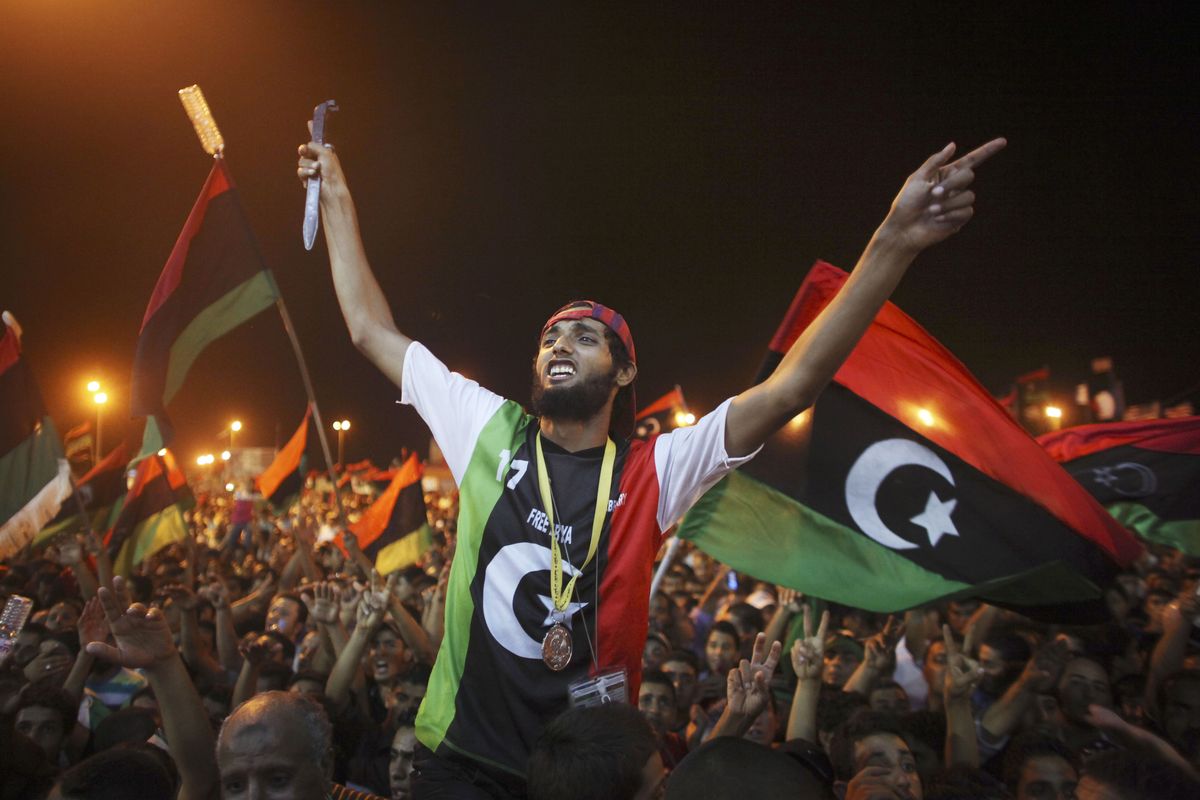Rebels control Tripoli
Gadhafi’s Libyan regime nears collapse as opposition forces sweep into capital

BENGHAZI, Libya – The long, brutal reign of Col. Moammar Gadhafi appeared to collapse Sunday as rebels swept into Tripoli, captured two of his sons and set off wild street celebrations in a capital that he’d ruled by fear for more than four decades, Libyan and NATO officials said.
With NATO bombings paving the way, rebel forces entered Tripoli with surprising ease and by early today controlled large swaths of the city. Gadhafi’s personal guard surrendered to rebel forces, and live television footage showed crowds of opposition supporters in Tripoli’s Green Square – the regime’s symbolic heart – unfurling the tricolor flag of pre-Gadhafi Libya and smashing the ruler’s portraits in scenes that were unthinkable just days ago.
“This is historic,” Amal Abdelrazk, a 42-year-old resident of downtown Tripoli’s Andalus Street, said by phone. “After 41 years, eight months and 27 days, we witness this moment. …
“The whole thing is like a dream.”
As rebels partied in the streets, hailed “as the victors of war,” Abdelrazk said, rebel military spokesman Col. Ahmed Bani told McClatchy Newspapers that his forces were hunting Gadhafi in and around Tripoli. Gadhafi’s whereabouts were unknown, but a U.S. official said, “We have no reason to believe (he) has left the country.”
Late Sunday, Gadhafi made a brief audio statement on Libyan TV, sounding desperate as he called on individual tribes and cities to “take weapons” and defend “beautiful Tripoli.”
“All the tribes, you must all march to Tripoli in order to defend and purify it,” he said, calling the rebels agents of Western powers. “Otherwise you will have no dignity. You will become slaves and servants in the hands of the imperialists.”
But the mercurial leader was nowhere to be seen, and for many Libyans, the regime’s death blow had come anyway with the rebels’ arrest of Seif al-Islam, Gadhafi’s feared and powerful son and onetime heir apparent, who’d vowed after the uprising against his father began earlier this year that the regime would fight its opponents “until the last bullet.”
The rebels’ Transitional National Council in the eastern city of Benghazi confirmed Seif al-Islam’s arrest. Luis Moreno Ocampo, chief prosecutor of the International Criminal Court, told CNN that he’d begin talks with the rebels today on transferring him to the custody of the court, which issued a warrant for his arrest in June on charges of crimes against humanity.
Another son, Saadi, also was arrested, and a third, Mohammed, reportedly surrendered. He appeared on the Al-Jazeera satellite channel and appeared scared and shaken, saying his house was surrounded by rebels. Near the end of the interview, gunfire rang out inside the house and the interview was cut off, but rebel officials later told the channel that Mohammed was unharmed and that they’d try to bring him to Benghazi.
President Barack Obama, vacationing on Martha’s Vineyard, Mass., said in a statement late Sunday: “Tonight, the momentum against the Gadhafi regime has reached a tipping point. Tripoli is slipping from the grasp of a tyrant.”
Obama, whose administration has recognized the rebel Transitional National Council as Libya’s legitimate government, called on the opposition to “continue to demonstrate the leadership that is necessary to steer the country through a transition” by respecting human rights, avoiding civilian casualties and paving the way to democracy.
“A season of conflict must lead to one of peace,” Obama said.
Thousands of Libyans celebrated in Benghazi, cheering and dancing to mark the apparent climax to an uprising that began there more than six months ago. Thunderous rounds of celebratory gunfire echoed as Mustafa Abdel Jalil, leader of the Transitional National Council, announced Seif al-Islam’s capture shortly before midnight.
“Finally, Libya is liberated,” said Ibrahim Shebani, 29, who joined the raucous party near Benghazi’s courthouse. “Stay tuned, world – you will finally get to meet the real Libyans.”
It marked a stunningly successful final push by rebel forces – for months described as ragtag and badly organized, and thought to be reeling from the mysterious assassination just weeks ago of their commander, Abdel Fattah Younes, a longtime Gadhafi lieutenant who defected at the start of the uprising. Younes’ death instead appeared to embolden the rebels, who in recent days routed pro-Gadhafi fighters from the strategic town of Zawiya, 30 miles west of Tripoli, and surged into the capital Sunday with little trouble.
Bani, the rebel military spokesman, said rebels from Zawiya were joined by reinforcements of scores of fighters from Misrata and Zlitan, two other rebel-held cities, who landed on a beach in Tajura, on Tripoli’s eastern edge, arriving by boat shortly after noon Sunday.
“It’s over. There is no more Gadhafi, no more secret police, no more blood,” Bani said.
Gadhafi’s most die-hard supporters tried to remain defiant. His chief spokesman, Moussa Ibrahim, visibly rattled and sweating profusely, warned a news conference in Tripoli that Libya would be plunged into civil war as tribes and towns loyal to the regime strike back at rebels. Online anti-Gadhafi activists described it as his “last appearance.”
“We have thousands and thousands of fighters who have nowhere to go but to fight,” Ibrahim warned.